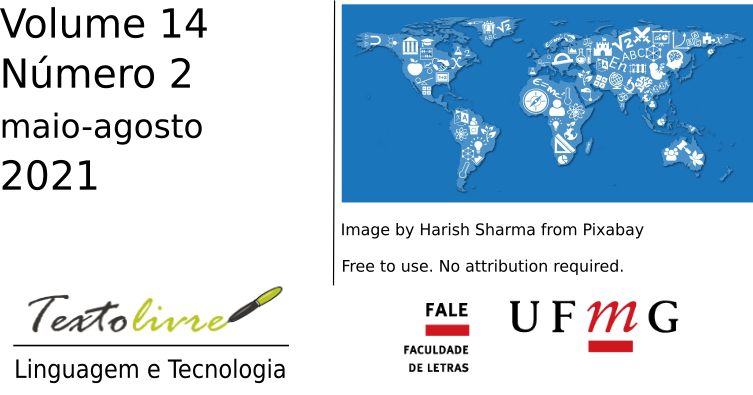Análise da experiência de professores do ensino superior português no contexto da COVID-19
DOI:
https://doi.org/10.35699/1983-3652.2021.33579Palavras-chave:
Metodologias de ensino e aprendizagem, Ensino superior, Ensino a distância, Ferramentas colaborativasResumo
O contexto atual da crise pandémica levou a mudanças educacionais inesperadas. Obrigou as instituições a adaptar rapidamente as suas metodologias de ensino e aprendizagem em todas as áreas, especialmente no ensino superior. Esta situação, atípica, deu origem a inúmeras reflexões sobre a capacidade das instituições de se adaptarem a este novo paradigma. Esta pesquisa tem como objetivo entender como os professores de uma Instituição de Ensino Superior (Instituto Politécnico da Guarda) ajustaram o seu processo de ensino e aprendizagem à situação de ensino a distância. Foi construída uma investigação quantitativa com um levantamento aplicado à população, sendo esta composta por 158 elementos, alcançando 102 respostas válidas, 65% da população. Os resultados mostram que, apesar das dúvidas e preocupações no início do processo, significando sempre um aumento substancial no volume de trabalho, houve uma rápida adaptação às novas metodologias de ensino e aprendizagem neste período de COVID-19. No geral, a maioria dos inquiridos considerou esta experiência de ensino a distância muito positiva.
Downloads
Referências
ALSABAWY, Ahmed Younis; CATER-STEEL, Aileen; SOAR, Jeffrey. Determinants of perceived usefulness of e-learning systems. Computers in Human Behavior, v. 64, p. 843–858, Nov. 2016. DOI: 10.1016/j.chb.2016.07.065. Available from: https://linkinghub.elsevier.com/retrieve/pii/S0747563216305556. Visited on: 1 June 2021.
AMIT, G. Choosing the right e-learning methods: factors and elements. E-learning Industry, v. 24, 2015. Available from: https://elearningindustry.com/choosing-right-elearning-methods-factors-elements. Visited on: 1 June 2021.
ANDERSON, Terry (Ed.). The theory and practice of online learning. 2nd ed. Edmonton: AU Press, 2008. BRUNO, Adriana Rocha; LEMGRUBER, Márcio Silveira. Docência na Educação online: professorar e (ou) tutorar? In: BRUNO, A. R.; BORGES, E. M.; SILVA, L. S. P. (Eds.). Tem professor na rede. Juiz de Fora: Editora UFJF, 2010.
DUNLAP, Joanna C.; GRABINGER, Scott. Preparing Students for Lifelong Learning: A Review of Instructional Features and Teaching Methodologies. Performance Improvement Quarterly, v. 16, n. 2, p. 6–25, Oct. 2008. DOI: 10.1111/j.1937-8327.2003.tb00276.x. Available from: http://doi.wiley.com/10.1111/j.1937-8327.2003.tb00276.x. Visited on: 12 June 2021.
GAEBEL, Michael et al. Digitally Enhanced Learning And Teaching. [S.l.], 2021. Available from: https://eua.eu/downloads/publications/digi-he%5C%20survey%5C%20report.pdf. Visited on: 1 June 2021.
GARRISON, D. R.; VAUGHAN, Norman D. Blended learning in higher education: framework, principles, and guidelines. 1st ed. San Francisco: Jossey-Bass, 2008. (The Jossey-Bass higher and adult education series).
ÍLIN, Güiden et al. Better e-Learning for Innovation in Education. Istanbul: ÖzKaracan, 2017.
KONRATH, Mary Lúcia Pedroso; TAROUCO, Liane Margarida R.; BEHAR, Patricia Alejandra. Competências: desafios para alunos, tutores e professores da EaD. RENOTE, v. 7, n. 1, June 2009. DOI: 10.22456/1679-1916.13912. Available from: https://seer.ufrgs.br/renote/article/view/13912. Visited on: 28 Sept. 2019.
LI, Cathy; LALANI, Farah. The COVID-19 pandemic has changed education forever. This is how. [S.l.: s.n.], 2020. Available from: https://www.weforum.org/agenda/2020/04/coronavirus-education-global-covid19-online-digital-learning. Visited on: 20 Apr. 2020.
MAJOR, Claire Howell. Do virtual professors dream of electric students? College faculty experiences with online distance education. Teachers College Record, v. 112, n. 8, p. 2154–2208, 2010. Available from: https://www.tcrecord.org/LIBRARY/exec.asp?ContentID=15946. Visited on: 1 June 2021.
MARTINHO, Domingos Santos. O Ensino Online nas Instituições de Ensino Superior Privado. As perspetivas: docente e discente e as implicações na tomada de decisão institucional. 2014. PhD thesis – Instituto de Educação, Universidade de Lisboa, Lisboa. Available from: https://repositorio.ul.pt/bitstream/10451/11686/1/ulsd068758_td_Domingos_Martinho.pdf. Visited on: 1 June 2021.
MATTAR, João; LOUREIRO, Ana; RODRIGUES, Elsa da Piedade. Editorial - Educação Online em Tempos de Pandemia: Desafios e Oportunidades para uma Escola Inclusiva. Interacções, v. 16, n. 54, p. 1–7, 2020. DOI: 10.25755/int.21999. Available from: https://revistas.rcaap.pt/interaccoes/article/view/21999. Visited on: 12 June 2020.
MCGILL, Tanya J.; KLOBAS, Jane E.; RENZI, Stefano. Critical success factors for the continuation of e-learning initiatives. The Internet and Higher Education, v. 22, p. 24–36, 2014. DOI: 10.1016/j.iheduc.2014.04.001. Available from: https://linkinghub.elsevier.com/retrieve/pii/S1096751614000190. Visited on: 20 May 2020.
OLIVEIRA, Kaio Eduardo de Jesus; LIMA, Daniella de Jesus; PORTO, Cristiane de Magalhães. Educação não escolar, aprendizagem ubíqua e novas formas de aprender. Interfaces Científicas - Humanas e Sociais, v. 3, n. 3, p. 41–50, June 2015. DOI: 10.17564/2316-3801.2015v3n3p41-50. Available from: https://periodicos.set.edu.br/humanas/article/view/2162. Visited on: 1 June 2021.
PALLOF, Rena M.; PRATT, Keith. Building online learning communities: efective strategies virtual classroom. 2st ed. San Francisco: Josey-Bass, 2007.
RODRIGUES, Ana Luísa. Como integrar o ensino online nas instituições de ensino superior? Revista do Fórum da Gestão do Ensino Superior nos Países e Regiões de Língua Portuguesa (FORGES), Ilhéus, v. 2, n. 1, p. 117–145, 2015. Available from: https://revistaforges.pt/index.php/revista/article/view/20/17. Visited on: 1 June 2021.
SPECTOR, J. Michael (Ed.). Finding your online voice: stories told by experienced online educators. Mahwah, New Jersey: Lawrence Erlbaum Associates, 2007.
WAKE, Jo Dugstad; DYSTHE, Olga; MJELSTAD, Stig. New and changing teacher roles in higher education in a digital age. Journal of Educational Technology & Society, v. 10, n. 1, p. 40–51, 2007. Available from: https://www.jstor.org/stable/pdf/jeductechsoci.10.1.40.pdf. Visited on: 1 June 2021.
ZWANEVELD, B.; BASTIAENS, T. Specifieke ict-competenties van docenten. OnderwijsInnovatie, v. 9, n. 4, p. 36–39, 2007.
Downloads
Publicado
Edição
Seção
Licença
Copyright (c) 2021 Texto Livre: Linguagem e Tecnologia

Este trabalho está licenciado sob uma licença Creative Commons Attribution 4.0 International License.
Este é um artigo em acesso aberto que permite o uso irrestrito, a distribuição e reprodução em qualquer meio desde que o artigo original seja devidamente citado.











